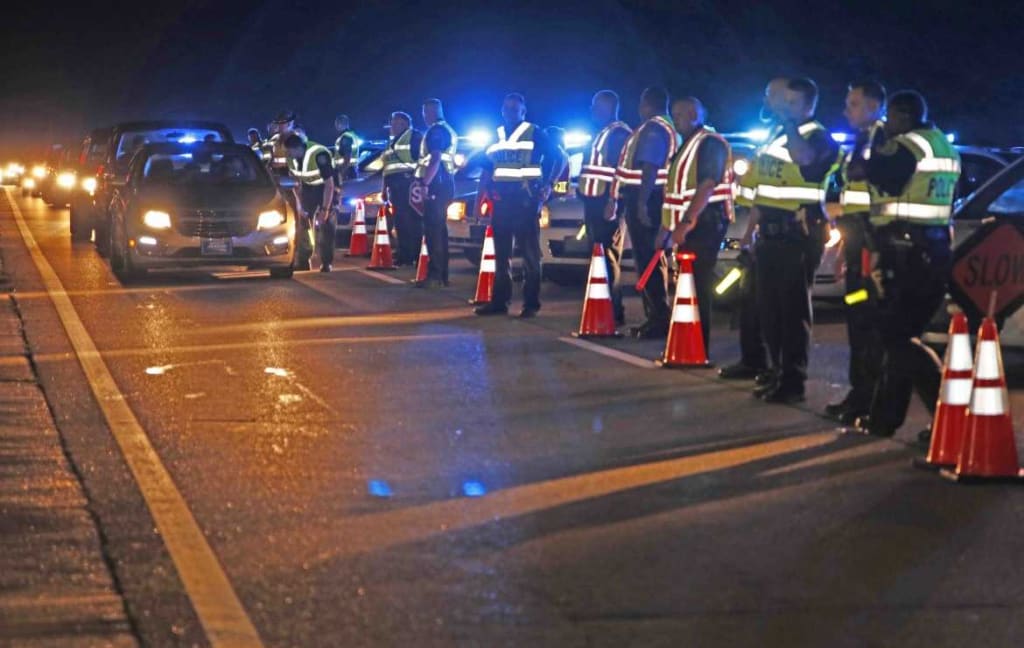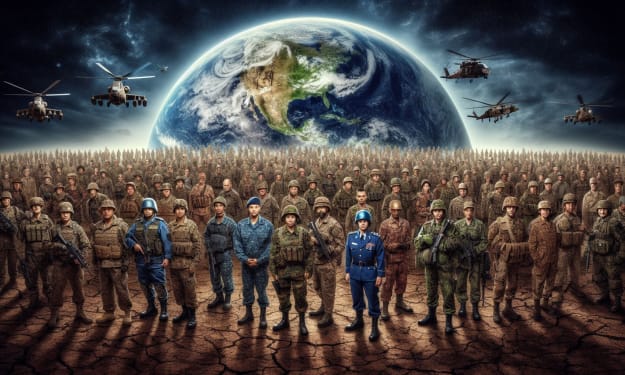Land of the "Free"
...And the Home of the Police Checkpoint

Baltimore Police are being accused of planting evidence on a suspect who was incarcerated for several months on drug charges. Whether the Department released the footage, or it was revealed against their wishes, I am not certain. What the video shows are three officers behind a building and one of them puts the drugs into a trash can. Then they exit to the front of the property, where he turns his body-cam on, unaware that the camera is always “on,” but only saves video starting from 30 seconds before the button is pushed. Then he walks back and “discovers” the evidence in the trash, which is public domain and not subject to a search warrant, and resulted in the suspect’s arrest.
It has been suggested that the officers were recreating the discovery once they realized that the arrest was imminent for the benefit of using the video later in court. I think that is an optimistic viewpoint. I can’t, or maybe just don’t want to, believe that they picked a guy to throw into jail for a felony at random, either. Besides which, that charge would have a hard time sticking unless they managed to put his hands on it. Anyone can put something into someone else’s trash can, that is barely even circumstantial. More than likely, the officers were intending on shaking the guy up to give them information. One of those things a cop might see as a “gray area” of the war on drugs.
The thing is that the entire question is beside the point: The Police should not be seeking out evidence for a case that hasn’t even happened yet. How does that get by people? For example, I will lay out the problem: If someone breaks into your home, and you call the police, they investigate. They are there to protect and serve. Now, they find your weed plant in the closet under a black-light. Great news for them! Now they have two cases, and they haul you off to jail.
The first crime is what the police were formed to deal with: One person acting against another’s interests. The second crime is only a crime because some people needed room to politically maneuver in the post-Nixonian seventies and they declared a “war on drugs.” You enjoy weed, so you grow a plant and mind your own business. However, “for your own protection,” possession can get you years in jail. If the amount is even remotely large enough to divide, you could be facing decades. It all depends on how good your attorney is, and most of us don’t have thousands of dollars lying around. Then you get a public defender, who is paid by the institution that now has a vested interest in seeing you prosecuted.
This is that Prison Industrial Complex people are talking about, and the concept is definitely in play, though I don’t agree that it is a deliberate machination of racism or classism. I just see circumstances causing a cycle that we aren’t sure how to break. I am not accusing anyone of any conspiracies. It is just that we never looked up until we were so entangled with laws that it is nearly impossible not to commit a misdemeanor every week. When that happens, guess who feels it first?
Police presence in minority neighborhoods is a cycle because of the crime, which is because of their economic circumstances, which leads to the need for crime. This led to Stop-and-Frisk laws, checkpoints, and an explosion in traffic regulation so that police have more reasons to stop and search. The war on drugs gets the numbers it needs to be sold to the public it is grinding into the dirt.
So now we have police actively seeking out violators to crimes that they don’t know about yet. They need to identify everyone that they interact with because there is no telling when someone may have a warrant they can be taken in on. The very circumstance creates a “hunter” mentality in the police, and this isn’t helped by the fact that so many people break the laws and wind up lying to police. The fact that these laws are the very definition of anti-American is completely irrelevant to the police officer. His job is to enforce the law and, as a veteran, I can say people in that position have heavy blinders.
Police use SWAT teams to serve routine warrants, and nearly every officer has riot-gear and a semi-automatic rifle in their cruiser. Not long ago, a four-year old girl was shot through the head by a SWAT officer serving a warrant when he entered the room before his flash-bang grenade went off. Three years ago, a former Marine and his wife were killed by a SWAT team that was serving a warrant at the wrong address. The couple thought they were responding to a break in and a firefight ensued.
Philando Castille would never have been killed if the police had been back at the scene of the burglary investigating instead of looking for a basic description of “insert black man here.” I won’t bore you by recounting my feelings on every case we heard about, but Philando Castille is dead because the police have taken the right to simply stop someone who looks like a suspect. If the burglar has left the scene and presents no threat, why are you chasing them? You have evidence at the scene that will lead you to him.
Libertarians, like me, are considered “Crazy” for saying things like this, but it is absolutely true: The Founding Fathers would be absolutely ashamed of the state of the rights that they left us. When the Miranda Case was in court, people should have paid more attention. What it really boils down to is: The police knew that he was entitled to an attorney, but it still required a court order before they publicized that fact at every arrest. Miranda still isn’t applied many times that it should be.
If you get busted for drugs, while you are on drugs, you can’t consent to Miranda, so they hold you until you sober up. However, if you get pulled over for DUI, which is the suspicion of being under the influence, you can still be very easily convicted despite not being able to legally understand your Miranda rights. It’s one of those things that is “for the greater good,” that have led us down this path. MADD stomped their feet and shouted at the legislators, and they passed a law based around the risk of damage, injury, or death. Then came checkpoints, sensibly placed on the roadways to maximize the amount of busts and not in parking lots, (where police could keep drunk drivers off the road entirely, but wouldn’t make as many arrests).
In short, we need some drastic changes to the laws, police tactics and conversation about the purpose of laws. The Police need to be less involved in our day-to-day lives to solve this problem. Oregon’s bold move to decriminalize possession is a step in the right direction, but more is needed. Checkpoints and random search and seizure laws need to be peeled back, because police will use any means to be successful at their jobs, the same as the CEOs that so many millennials fear. It is human nature to seek success and to justify all manner of infringements on the rights of others “for their own good” or “for the most good,” and once we are on that road, where is the line?
Expanding government happens for the same reason that it is a terrible idea: Because you can’t possibly meet every need and want for hundreds of millions of people. The basic laws get broken, so new laws are implemented to try and limit the ability to break the basic law and so on and so on until we get to the point where not carrying ID is a crime because the police don’t know whether or not to arrest you. The police could be authorized to search at-will, because you should have nothing to hide. We need to remember that we are the government, and that we determine what is in our best interests. We don’t need more laws, we need to see the police without having handcuffs on. We need to repeal some of the tens of thousands of laws we have whose sole plaintiff is the government. Every law we have is a chance that a police officer will have to destroy or take a life and the more we regulate, the more power we have to give them to enforce it.






Comments
There are no comments for this story
Be the first to respond and start the conversation.